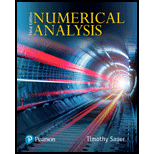Solutions for Numerical Analysis
Problem 1E:
Apply two steps of Newton’s Method with initial guess x0=0 . (a) x3+x2=0 (b) x4x2+x1=0 (c) x2x1=0Problem 3E:
Use Theorem 1.11 or 1.12 to estimate the error ei+1 in terms of the previous error ei Newton’s...Problem 4E:
Estimate
as in Exercise 3.
(a) ; ,
(b) ; ,
Problem 5E:
Consider the equation 8x412x3+6x2x=0 . For each of the two solutions x=0 and x=1/2 , decide which...Problem 7E:
Let fx=x47x3+18x220x+8 . Does Newton’s Method converge quadratically to the root r=2 ? Find...Problem 10E:
Find the Fixed-Point Iteration produced by applying Newton’s Method to fx=x3A . See Exercise1.2.10.Problem 11E:
Use Newton’s Method to produce a quadratically convergent method for calculating the root of a...Problem 13E:
(a) The function has a root at . If the error after four steps of Newton’s Method is , estimate ....Problem 14E:
Let
denote the Newton’s Method iteration for the function . Define to be the result of two...Problem 1CP:
Each equation has one root. Use Newton’s Method to approximate the root to eight correct decimal...Problem 3CP:
Apply Newton’s Method to find the only root to as much accuracy as possible, and find the root’s...Problem 7CP:
Consider the function fx=esin3x+x62x4x31 on the interval 2,2 . Plot the function on the interval,...Problem 10CP:
Set fx=54x6+45x5102x469x3+35x2+16x4 . Plot the function on the interval 2,2 , and use Newton’s...Browse All Chapters of This Textbook
Chapter 0.1 - Evaluating A PolynomialChapter 0.2 - Binary NumbersChapter 0.3 - Floating Point Representation Of Real NumbersChapter 0.4 - Loss Of SignificanceChapter 0.5 - Review Of CalculusChapter 1.1 - The Bisection MethodChapter 1.2 - Fixed-point IterationChapter 1.3 - Limits Of AccuracyChapter 1.4 - Newton’s MethodChapter 1.5 - Root-finding Without Derivatives
Chapter 2.1 - Gaussian EliminationChapter 2.2 - The Lu FactorizationChapter 2.3 - Sources Of ErrorChapter 2.4 - The Pa = Lu FactorizationChapter 2.5 - Iterative MethodsChapter 2.6 - Methods For Symmetric Positive-definite MatricesChapter 2.7 - Nonlinear Systems Of EquationsChapter 3.1 - Data And Interpolating FunctionsChapter 3.2 - Interpolation ErrorChapter 3.3 - Chebyshev InterpolationChapter 3.4 - Cubic SplinesChapter 3.5 - Bézier CurvesChapter 4.1 - Least Squares And The Normal EquationsChapter 4.2 - A Survey Of ModelsChapter 4.3 - Qr FactorizationChapter 4.4 - Generalized Minimum Residual (gmres) MethodChapter 4.5 - Nonlinear Least SquaresChapter 5.1 - Numerical DifferentiationChapter 5.2 - Newton-cotes Formulas For Numerical IntegrationChapter 5.3 - Romberg IntegrationChapter 5.4 - Adaptive QuadratureChapter 5.5 - Gaussian QuadratureChapter 6.1 - Initial Value ProblemsChapter 6.2 - Analysis Of Ivp SolversChapter 6.3 - Systems Of Ordinary Differential EquationsChapter 6.4 - Runge–kutta Methods And ApplicationsChapter 6.5 - Variable Step-size MethodsChapter 6.6 - Implicit Methods And Stiff EquationsChapter 6.7 - Multistep MethodsChapter 7.1 - Shooting MethodChapter 7.2 - Finite Difference MethodsChapter 7.3 - Collocation And The Finite Element MethodChapter 8.1 - Parabolic EquationsChapter 8.2 - Hyperbolic EquationsChapter 8.3 - Elliptic EquationsChapter 8.4 - Nonlinear Partial Differential EquationsChapter 9.1 - Random NumbersChapter 9.2 - Monte Carlo SimulationChapter 9.3 - Discrete And Continuous Brownian MotionChapter 9.4 - Stochastic Differential EquationsChapter 10.1 - The Fourier TransformChapter 10.2 - Trigonometric InterpolationChapter 10.3 - The Fft And Signal ProcessingChapter 11.1 - The Discrete Cosine TransformChapter 11.2 - Two-dimensional Dct And Image CompressionChapter 11.3 - Huffman CodingChapter 11.4 - Modified Dct And Audio CompressionChapter 12.1 - Power Iteration MethodsChapter 12.2 - Qr AlgorithmChapter 12.3 - Singular Value DecompositionChapter 12.4 - Applications Of The SvdChapter 13.1 - Unconstrained Optimization Without DerivativesChapter 13.2 - Unconstrained Optimization With Derivatives
Sample Solutions for this Textbook
We offer sample solutions for Numerical Analysis homework problems. See examples below:
Given information: f(x)=x3−4x+1 Theorem used: Intermediate Value Theorem: If f is a continuous...Given information:Initial guesses x0=1 and x1=2 and equation is (a) x3=2x+2 . Calculation: With the...Chapter 2.7, Problem 1EChapter 3.5, Problem 1EChapter 4.5, Problem 1EChapter 5.5, Problem 1EChapter 6.7, Problem 1EChapter 7.3, Problem 1CPChapter 8.4, Problem 1E
More Editions of This Book
Corresponding editions of this textbook are also available below:
Student Solutions Manual for Numerical Analysis
2nd Edition
ISBN: 9780321783929
Numerical Analysis
2nd Edition
ISBN: 9780321783677
Numerical Analysis, Books A La Carte Edition (2nd Edition)
2nd Edition
ISBN: 9780321816764
EBK NUMERICAL ANALYSIS
3rd Edition
ISBN: 9780134699370
Numerical Analysis
3rd Edition
ISBN: 9780134697376
Numerical Analysis, Books A La Carte Edition (3rd Edition)
3rd Edition
ISBN: 9780134697338
Numerical Analysis
1st Edition
ISBN: 9780321268983
Student Solutions Manual For Numerical Analysis
1st Edition
ISBN: 9780321286864
Related Math Textbooks with Solutions
Still sussing out bartleby
Check out a sample textbook solution.
